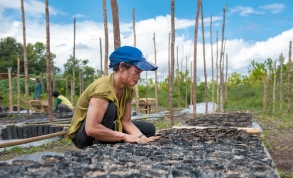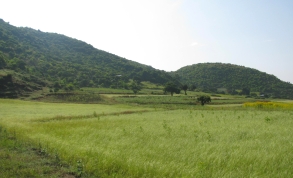Abstract
Tanzania experiences heavy forest losses, approximately 1-2% of forest is lost every year, contributing to the loss of ecosystem services, such as food provision, and limiting the country’s potential to sequester greenhouse gas (GHG) emissions. In 2016, the Ntakata Mountains program was established by Carbon Tanzania as part of a wider initiative, the Tuungane project, which aims to create integrated solutions to create healthier families, fisheries, and forests, working with multiple villages across coastal and inland settings. The Ntakata project has developed Village Land Forest Reserves which are protected forest lands that allow the communities to farm in designated areas and protect forests. Carbon revenues empower local communities and help generate income to fund health and education. In 2021, 550,000 tonnes of CO2 were verified as carbon credits, out of which US$ 179,000 were spent on improving health infrastructure.
Intervention overview
Approximately 1-2% of Tanzania’s forests are lost every year which results in significant losses of ecosystem services such as food and resource provision as well as regulation of water cycles and prevention of soil erosion. Forest loss particularly affects populations that directly rely on forest products for livelihood, or farming communities that are reliant on rainfed agriculture and healthy soils. The forested areas of the Greater Mahale Ecosystem are under threat from agricultural expansion, indiscriminate fires, and illegal forest harvesting. Tree loss also compromises the country’s potential to sequester greenhouse gas (GHG) emissions. In Western Tanzania, forest habitats nurtured by the Bende, Tongwa, and Ha people are in danger due to unsustainable land-use practices such as mining, creation of new infrastructures, slash and burn agriculture and uncontrolled grazing by pastoralists. As a result, the region has nearly three times higher deforestation rate than the national average, which leads to an acute loss of plant and animal biodiversity.
In 2012, The Nature Conservancy and Pathfinder International set up the Tuungane Project, which was designed to create integrated solutions to create healthier families, fisheries, and forests, working with multiple villages across coastal and inland settings. One key element of the Tuungane Project is forest management and the protection of the forested areas of the Greater Mahale ecosystem from fires, and illegal harvesting. A program was established by Carbon Tanzania in 2016 that is supporting eight villages in the Ntakata Mountains area to generate income through carbon credits earned from protecting their forests. As part of the Ntakata Mountains project, Village Land Forest Reserves were set up, and 116 forest scouts were trained and deployed to protect endangered species. The conservation activities also generate income for the communities through verifiable carbon credits (verified through two independent organisations: Verified Carbon Standard and The Climate, Community, & Biodiversity Alliance). Revenue from the carbon credits are paid bi-annually directly to the local communities, enabling them to manage their own development needs. The revenue generated is estimated to improve the livelihoods of approximately 38,000 local people. Revenues are also used to enforce land protection plans and to prevent illegal logging, for example through training village scouts.
Outcomes
The Ntakata Mountains project protects over 216,000 ha of woodland. In 2021, it prevented around 1.25 million trees from being cut down, averted 550,000 tonnes of CO2 emissions and generated US$ 1,570,000 through carbon credits, out of which US$ 179,000 were spent on improving health infrastructure.
The revenue from carbon trading has been used to improve healthcare and education, and has helped to advance gender equality. A Community Health Fund covering the medical expenses of around 26,400 local people was established. The revenue was also used to set up two pharmacies, two ward hospitals and four village dispensaries. Other benefits include improved access to education for example by building 16 additional classrooms at the local school and providing one hot meal per day to its 571 students. A dormitory for girls was also built, reducing the dropout rate to zero and increasing the number of female students applying to colleges. Another benefit of the project is increased employment opportunities - 64 people are directly employed in forest conservation activities, while carbon finance supports 91 women-led business initiatives. Under Tuungane, reproductive health initiatives include upgrading health clinics, for example, the installation of solar suitcases provide electricity during nighttime birth and has dramatically reduced maternal and neonatal deaths. Lastly, more than 20,000 farmers have been trained in Climate Smart Agriculture which has seen an average 50% increase in crop yields and improved water quality at Lake Tanganyika by preventing run-off.
Feasibility and potential impact of scale-up
Village Land Forest Reserves are integral strategies to reduce emissions from deforestation. Preventing deforestation has the potential to mitigate 25% of global emissions and is one of the most cost-effective ways to mitigate climate change. Forest conservation coupled with carbon credits helps local communities to follow through with plans and improve livelihoods through investments in education and health.
Carbon Tanzania has implemented two other forest protection programmes in Tanzania that generate profits through carbon credits and improve the livelihoods of local communities. Over the past years, the social enterprise developed projects that protected over 688,000 ha of forest and benefitted over 113,000 people in Tanzania. In 2021 alone, the three projects averted 857,284 tonnes of CO2 emissions, protected 1,689,700 trees and generated revenues of US$ 2,041,638 through carbon credits.
References
Academic profile / relevant organisation’s page
- Carbon Tanzania. (2021). Impact Report 2021. Available online: https://www.carbontanzania.com/wp-content/uploads/2022/05/impact-report…
- The Tuungane Project - Creating healthier families, fisheries, and forests in western Tanzania - https://www.nature.org/en-us/about-us/where-we-work/africa/stories-in-a…;
- Leisher, 2021. Lancet Planetary Health. Improving wellbeing by integrating health and conservation: findings from cross-sectional surveys
Supplementary information
- Carbon Tanzania. (2021). Ntakata Mountains Project. Available online: https://www.carbontanzania.com/wp-content/uploads/2021/11/Ntakata-Mount…;
- Jameel, Y., Patrone, C. M., Patterson, K. P., & West, P. C. (2022). Climate–poverty connections: Opportunities for synergistic solutions at the intersection of planetary and human well-being. Project Drawdown. https://doi.org/10.55789/y2c0k2p2
Contact
- Craig Leisher, The Nature Conservancy, Email: [email protected]
Image credit
- Marc Baker, Carbon Tanzania


